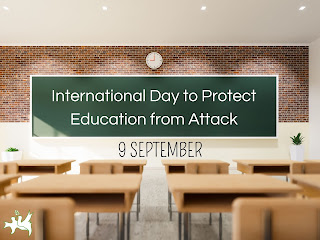International Day To Protect Education From Attack
“Learning is strengthened and solidified when it occurs in a safe, secure and normal environment.”- Jean-Bertrand Aristide.
September 9 marks the third United Nations (UN) International Day to Protect Education from Attack. All across geographic areas attacks on educational institutions continue to occur, from the Democratic Republic of Congo (DRC) to Ukraine, from Cameroon to Syria, from the West Bank to Yemen, from Nigeria to Somalia, the need to galvanize efforts, energy and commitment behind the protection of education in the context of armed conflict is sadly more urgent than ever. According to the United Nations Educational, Scientific and Cultural Organization (UNESCO) in most countries with armed conflicts, the military use of schools and other educational institutions remains a constant feature, depriving students of their right to access quality education and teachers from the ability to deliver learning adequately. Over the past 6 years, the Global Coalition to Protect Education from Attack (GCPEA) collected over 13, 400 reports on education or military use of educational facilities worldwide, with more than 25,000 students, teachers and academics injured, killed or harmed in such attacks carried out in situations of armed conflicts or insecurity. In recognizing the importance of raising awareness on the dire need to preserve education and protect it from attack, the UN Resolution designates UNESCO and UNICEF to serve as co-facilitators for the yearly observance of this Day. The day also calls upon stakeholders to keep this issue at the top of the international agenda and duly act to alleviate the plight of students affected by armed conflicts. Schools, universities and educational dwellings should always be safe havens to foster peace and development. Students' civilian nature should be recognized and protected, never targeted. Undoubtedly, armed conflicts bring many devastating barriers to learning. The protracted nature of conflicts today negatively affects the future of entire generations, particularly that of children and most vulnerable populations. The right to education must be respected, upheld and enjoyed by everyone, especially in situations of armed conflict and insecurity.
Safe Schools Declaration
The Safe Schools Declaration is an inter-governmental political commitment that provides countries the opportunity to express support for protecting students, teachers, schools, and universities from attack during times of armed conflict; the importance of the continuation of education during armed conflict; and the implementation of concrete measures to deter the military use of schools. The right to education is not waived during armed conflict. States are bound by international law to uphold the right to education during the contexts of armed violence and conflict. To date, some 114 states have signed the Safe Schools Declaration which is a vital step in committing to upholding the right to education and in signaling accountability.
In 2015, the governments of Norway and Argentina led a process among United Nations (UN) Member States to develop the Safe Schools Declaration, an inter-governmental political accord dedicated to protecting education in armed conflict. The Safe Schools Declaration outlines a set of commitments to strengthen the protection of education from attack and restrict the use of schools and universities for military purposes. It seeks to ensure the continuity of safe education during armed conflict.
The Declaration was opened for countries to endorse at the First International Conference on Safe Schools in Oslo, Norway, in May 2015. In March 2017, the government of the Argentine Republic hosted the Second International Conference on Safe Schools, further building upon the development of a global community dedicated to protecting education in armed conflict. In May 2019, the government of Spain hosted the Third International Conference on Safe Schools in Palma de Mallorca, and in October 2021, the government of Nigeria hosted the Fourth International Conference on the Safe Schools Declaration in Abuja. The Declaration builds a community of nations committed to respecting the civilian nature of schools and developing and sharing examples of good practices for protecting schools and universities during armed conflict. It offers guidance on concrete measures that armed forces and armed non-state actors can take to deter military use of educational facilities, to reduce the risk of attack, and to mitigate the impact of attacks and military use when they do occur.
Countries also commit to collect, or facilitate the collection of, data on attacks on education; investigate and prosecute war crimes involving education; and provide assistance to victims. On this important day it is the responsibility of the international community to re-commit themselves in ensuring that all measures are taken to safeguard education from attack. Schools should never be a target.
In the words of Nelson Mandela, it is not beyond our power to create a world in which all children have access to a good education.
Wayne Campbell is an educator and social commentator with an interest in development policies as they affect culture and or gender issues.
waykam@yahoo.com
@WayneCamo
©
#InternationalDaytoProtectEducationfromAttack




Comments
Post a Comment